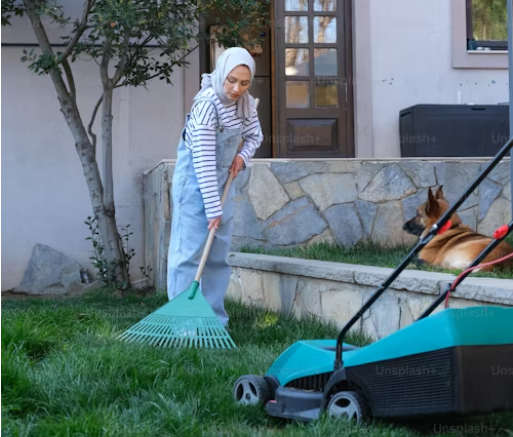
Does your garden look like a jungle instead of a peaceful haven? Weeds, overgrown plants, and scattered debris can turn your outdoor space into an ugly sight.
No matter how much hard work you have put in, it is so annoying when it goes to nothing. You spend hours trying to maintain it but each time you are left with a bigger mess than before. The longer you leave it the worse it becomes and also this could even become a breeding ground for pests.
Stop stressing about Garden Cleaning. Our professional gardening services will make your garden beautiful in no time at all. From weeding and pruning to removal of any litter that may be lying around, we will take care of everything for you so that you do not need to lift a finger while still enjoying a neat garden.
Table of Contents
Importance of Garden Maintenance
There are many reasons why one should take care of their yard. Well-kept gardens make your house look good in general. This makes your home more beautiful and attractive.
Consistently taking care of plants keeps them from being destroyed by pests and diseases. Pruning, weeding as well as proper watering cause the growth of strong healthy plants.
A tidy and well-maintained garden can increase the value of your home. A lot of people usually pay extra for a house with a nice yard. For instance, through an appropriate selection and maintenance of plants, gardens clean air, save water, and provide homes for various species.
Gardening helps you feel better. It gets your adrenaline racing, reduces stress levels, and gives you satisfaction of seeing your plants grow. Pests also live in overgrown gardens which may be a source of fire hazard. These risks are avoided by regular maintenance. Your yard can become more helpful if you manage it properly by ensuring that nothing is wasted or cluttered in any section.
Garden Cleaning Tools and Equipment
To have a clean and well-groomed garden, one must have the necessary tools for gardening. Below are some of the must-have items to keep your garden in its best condition.
1. Rake
A rake is useful for collecting leaves, grass clippings, and other rubbish. Gather all the lighter stuff using a leaf rake specifically meant for leaves and other light weight rubbish. This type of rake is heavier and more durable that makes it ideal for soil breaking or removing bigger pieces of litter.
2. Leaf Blower
This machine can instantly blow away leaves and other tiny objects on your lawn or flower beds. The electric leaf blower is small, light, and easy to use. It is suitable for small to medium-sized areas. Gasoline powered leaf blower is stronger than an electric one hence good for larger fields but heavy and noisy too.
3. Pruning Shears
To trim and shape plants, you will need to have pruning implements for the same. Healthy growth of a plant may be retained by removing any dead or growing branches that could hinder its development. You can find shears for trimming in various styles as bypass or anvil pruners. Bypass style features two blades sliding past each other to make a neat cut and is good for cutting living twigs. Anvil pruners, on the other hand, have straight blade that cuts against a flat edge when cutting through dead wood.
4. Garden Hose
A garden hose with a good nozzle will serve to clean hard areas and water plants. Choose a durable hose that does not kink easily for better results and convenience in using it. They feature nozzles with spray patterns that can be adjusted enabling one to control flow of water which makes it easier to clean hard surfaces or water-sensitive plants such as those indoors. Ensure you pick the right length of the hose depending on your yard size with strong connections so that it cannot leak.
5. Wheelbarrow
Soil, compost, plants, and yard waste are easy to move if you have got wheelbarrows with you. Look for one that has strength, balance, and a handle easy to hold onto as well. Pneumatic tires found in some of these products make them more maneuverable on rough terrains also known as pneumatic tires while choosing a wheelbarrow considering its capacity what is it made from? Steel-made ones last longer but are heavy whereas plastic ones are lighter in weight but weaker compared to steel-made plasticky wheelbarrows
6. Garden Gloves
It is a good idea to wear a pair of garden gloves to protect your hands from thorns, splinters and dirt. This helps with holding the tools as well. Different materials like leather, rubber or cotton are used in making gloves which are suitable for different purposes. Leather gloves are the best when doing heavy work because they offer protection and last long. Rubber gloves on the other hand are best for chemicals handling and getting them wet.
7. Shovel and Spade
You will need these tools to dig holes, plant seeds and move soil around. A shovel has a sharp blade that makes it perfect for breaking ground or digging larger holes. The flat blade of a spade is excellent for cutting edges out of things, cutting through dirt or moving plants. It is important that both tools should have handles that can be easily held on to while using them. The handles should have soft grips that make them more comfortable for longer use.
8. Hedge Trimmer
When it comes to taking care of hedges and trees, hedge trimmer saves you time and effort. You can get grass trimmers that run on gas or electricity; each type has its pluses as well as minuses Electric trimmers tend to be smaller, quieter, lighter but require either an electric outlet nearby or battery charged up Gas powered ones cut stronger in bigger areas but usually weigh more and make more noise
9. Compost Bin
For instance, through the usage of compost bin for yard waste, one can turn it into very useful soil manure. In addition, less garbage is likely to be disposed off and the stuff used may serve as food for your plants. This can consist of a variety of styles like simple open piles or more complex tumblers that make the compost easy to turn. An important thing is to ensure that there is good inflow and outflow inside the container so that organic matter rots aerobically.
10. Pressure Washer
Another option for cleaning hard outdoor surfaces such as patios and paths is using pressure washer. This equipment does an excellent job at removing dirt, mosses and mildew from these exteriors. There are electric and gas powered pressure washers; lightweight electric ones are better suited for small jobs while gas-powered ones have higher water pressure needed for tougher assignments. Furthermore, you can change how powerful the spray is for different parts you clean simply by modifying nozzles.
With this range of tools one can keep their garden neat all year round without much struggle. A garden that thrives beautifully every season indicates proper care with appropriate tools being used in its maintenance throughout every season.
Seasonal Garden Cleaning Guide
Maintaining a beautiful garden requires year-round attention. Here are some seasonal garden cleaning tips to help you keep your outdoor space looking its best through every season.
Spring Cleaning Tips
In spring, after a period of winter, you can make your garden look new. Remove all the leaves and other trash that may have gathered in the garden during winter. This will enable the garden to breathe and prepare for new growth. Cut off any dead or damaged branches to help trees and plants have healthy new growth. Dig out weeds before they take root in early spring. Add organic waste into your soil to give your plants the required nutrients. If you want your spring flowers and vegetables to grow well, then go ahead and plant them now
Fall Preparations
During fall, taking care of your garden is very essential. It is important to regularly rake out leaves so that they do not cover up lawns and flower beds. Plant flowers such as tulips and daffodils, why During summer, it is warm and things are growing; however, the garden should be cared for on a regular basis for its good health. Plants need plenty of water especially when it is dry outside. The best time to water so that water does not evaporate too fast is early in the morning or late at night. Use mulch on top of the soil surface, which helps keep dirt cool, and moist and prevents weeds from growing. Look out for pests and get rid of them as soon as possible so that they cannot harm your plants. Frequently remove dead flowers from your garden bed so that it always looks neat plus allows more blooms to appear. Trim your lawn regularly so that it grows properly at an appropriate height.
Before winter comes, cut back plants and trim hedges. Use a slow-release fertilizer to fuel your plants throughout the cold. Protect fragile plants from frost or mulch them.
Winter Care
You cannot ignore winter when it comes to working on your yard, though it may seem like an inappropriate season for gardening. Take precautions by moving tender plants indoors or covering them against frost. Try cleaning and sharpening outdoor tools in readiness for springtime. Look out for these pests staying into the winter period and control them.
Debris Removal
A clean and healthy garden partly depends on one’s ability to get rid of garbage. As time goes by, various types of trash accumulates in gardens including dead plants, broken branches as well as leaves and other organic and inorganic waste products.
While walking around your yard, watch out for places where much rubbish has accumulated. In your notes include a list of different kinds of rubbish that you can see like organic (for example: leaves, branches) or inorganic (plastic, metal).
The elimination of garbage from the garden makes it have an attractive look and also helps the plants to grow healthier by reducing pests’ hiding places and improving soil conditions. If you constantly clean it up, your garden will always remain beautiful and inviting throughout the year.
Soil Preparation to make your Garden beautiful
Preparing soil is an important gardening practice that has great impacts on the health and productivity of your plants. Before planting anything, it is necessary to prepare soil so that it can be rich in nutrients, have good structure and not have any weeds or other unwanted material.
Testing Soil Quality
Knowing how good your soil is before you plant is very important. You can test its pH level, nutrient content as well as its texture. Take small samples of soil from different parts of your garden to check the quality. Let them dry naturally. You may employ a soil test kit to determine pH levels and nutrients or send samples to a professional lab for more detailed outcomes.
Adding Compost and Fertilizers
Once you identify what’s wrong with your soil, you can improve it by adding composts and fertilizers. There are two types of fertilizers; organic (for instance manure) and inorganic (such as synthetic). By examining the quality of the soil and adding appropriate composts and fertilizers, you will provide your plants with the required nutrients for growth.
Recycling and Composting

It is vital that you maintain a clean garden for the wellbeing of your plants and the aesthetic appeal of your outdoor space. These two good habits can help you deal with garden waste and help the environment at the same time: recycling and composting.
Recycling and composting are beneficial to you in various ways. They lower the amount of garden waste that finds its way into landfills, improve soil quality by making nutrient-rich compost, and promote eco-friendly practices by reducing greenhouse gas emissions.
Start with all your garden garbage such as grass cuttings, leaves, and branches, among others. Plastic pots go in one pile metal stakes go in another pile and glass containers go separately. Put these items into appropriate recycling bins and ensure they are free from other materials that may cause harm.
Make a heap or use a bin for composting purposes. Integrate brown stuff like dry twigs and leaves with green matter such as grass clippings and vegetable remains. Regularly turn over composts to allow air in them so they can break down faster.
To be successful when dealing with composts combine green with brown materials, and maintain moisture but avoid too much wetness on it plus regular turning is required so that it is aerated throughout. Exclude meat, milk products as well as sick plants from being included in your compost pit.
When cleaning up your yard using recycling methods or through composting makes it healthier as well as more sustainable towards the environment. By treating garden trash properly you not only lessen environmental impact but also create assets which will sustain growth of gardens in future.
Conclusion
Having a neat and well-organized garden is important for the health of your plants and its appearance. Regularly cleaning the garden inhibits the spread of pests and diseases, promotes healthy plant growth, and makes outside spaces more inviting. Taking time out to do things such as weed out, trim back, and clear up after ourselves means our gardens will look great all year round.
Bear in mind that you can keep it in good condition with some effort. Go get your gardening tools ready because your garden needs some tendering care.
Frequently Asked Questions
How do you clean your garden?
Firstly, you need to eliminate any nuisance plants. Ensure that you remove the roots so that they do not grow back. Trim off all stems that are dead or too long to promote vigorous shoots. Put leaves and other debris fallen on the ground into a compost pile or throw them away. Dig up any dead plants from your garden and overturn the soil for it to be refreshed. Divide organic waste so that it can be composited; toss out other trash in accordance with local regulations.
How to sanitize your garden?
Clean yard tools with a mixture of 1 part bleach and 9 parts water. Take out any sick plants and dispose them safely. Use natural insecticides which can kill pests without harming beneficial insects. Spread clear plastic over soil to kill pathogens as well as dry for four to six weeks under sun light. Keep water sources like bird baths or ponds clean so that algae and mosquitoes do not emerge.
How much does garden maintenance cost in 2024?
Prices may differ based on how much work costs and how many services are available within an area. Commonly, regular gardening maintenance goes for around $50-$200 each month. Otherwise, one-time service such as comprehensive clean-up costs range between $200 -$600.
Why are garden clean-ups important?
For various reasons, it is important that gardens are cleaned regularly. Killing diseases by removing unhealthy or dead plants. A well-groomed lawns adds beauty to your home in its entirety. Bug hiding places become reduced if no trash exists. Crop pruning helps create room around them for better growth. Clearing dangers like fallen trees could prevent accidents from taking place here.


